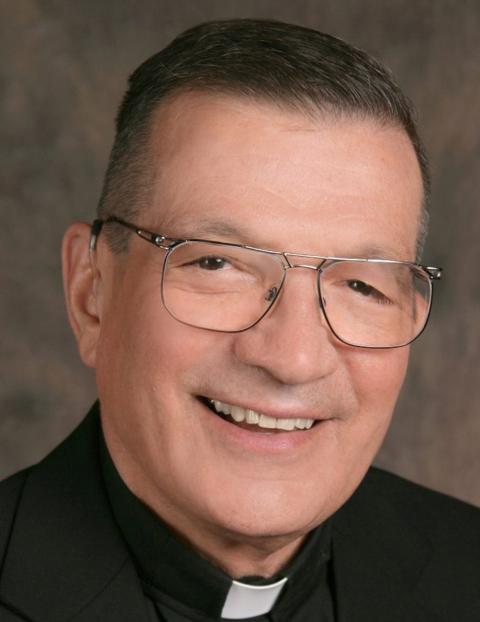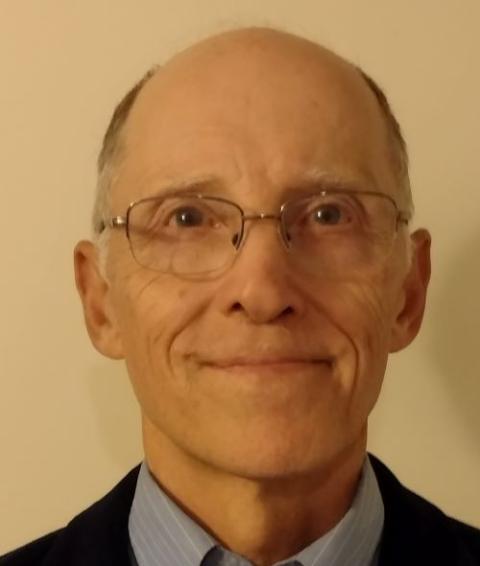Suzanne Emerson, from Silver Spring, Md., holds a sign during a press conference by SNAP, Survivors Network of those Abused by Priests, as the 2018 United States Conference of Catholic Bishops in Baltimore. (CNS/Catholic Review/Kevin J. Parks)
Earlier this year, the retired bishop of the Diocese of Yakima, Washington, received a formal reprimand from the Vatican for how he handled clergy abuse allegations — and possibly for how he treated a whistleblower.
Victim advocates have praised the Vatican's actions on that case as a rare rebuke of a bishop. Yet the dearth of information about both the investigation and subsequent reprimand appears to reinforce advocates' concerns about one of Pope Francis' landmark achievements on clergy abuse. Last week's report that retired East Timor Bishop Carlos Filipe Ximenes Belo was secretly sanctioned for alleged abuse has raised similar critiques.
Vos Estis Lux Mundi ("You Are the Light of the World"), issued by Francis in 2019, is a sweeping set of laws that includes a system to evaluate reports of abuse or cover-up by bishops. Bishop Carlos Sevilla, who led the central Washington diocese from 1996 until retiring in 2011, was investigated under the system put in place by Vos Estis, according to reporting by the Yakima Herald-Republic.

Bishop Carlos Sevilla served as bishop of the Diocese Yakima, Washington, from 1996 until retiring in 2011. Sevilla, 87, is pictured in an undated photo. (CNS/Diocese of Yakima)
Sevilla, 87, received what the Vatican called a "reproof" for causing "scandal or a grave disturbance of order," Msgr. Robert Siler, episcopal vicar and spokesperson for the Yakima Diocese, told NCR, confirming what the Yakima paper had reported in July.
The contents of the Vatican's letter to Sevilla were not made public, and neither the Yakima Diocese nor Robert Fontana, a former diocesan director of evangelization who requested the investigation, received a copy. Fontana, who left the diocese in 2005, said he was retaliated against while employed there and years afterward for criticizing Sevilla's handling of alleged sex abuse cases.
An important provision of Vos Estis is that it affirms whistleblowers cannot be discriminated or retaliated against, said Anne Barrett Doyle, co-director of BishopAccountability.org, a Massachusetts-based nonprofit tracking Catholic clergy abuse cases. But, because of the secrecy, it is unclear if the papal reprimand of Sevilla was related to that provision.
"I derive some hope that — thanks to Robert — there was a rebuke, but what the bishop received was very minimal," Doyle said. "At the same time there is no accountability without public information. Secrecy does not serve justice or the victims."
Yet some canon law experts are hesitant to weigh in on the significance of the reprimand based on the details publicly available.
Jennifer Haselberger is a canon lawyer and whistleblower whose efforts in the Archdiocese of St. Paul and Minneapolis helped spur criminal and civil charges, large settlements and broad changes in that archdiocese.
'There is no accountability without public information. Secrecy does not serve justice or the victims.'
— Anne Barrett Doyle
Haselberger said Fontana was no doubt trying to do his best on behalf of survivors. However, she believes there isn't enough information to draw any conclusions about the case.
She also understands concerns about the secrecy that surrounds Vos Estis investigations but said the purpose of the reporting processes outlined in the document is to encourage internal reporting, which is, by necessity, not public.
"This is something that you see mirrored in corporations," she said. "If you are a tire company, for example, you want to have a system in place to report defects in a tire before going out to regulators. They have that process for the same reasons the church wants it — to correct issues early, to not lose public confidence and to avoid legal consequences when they can."
Zach Hiner, executive director of the Survivors Network of those Abused by Priests (SNAP), said the secrecy in Vos Estis investigations is troubling, "but if they must be internal, so be it."
"If the results are also secret, though, then what's the point?" he said. "If everything is kept internal, how is the leadership in the church doing something much different than it's always done? It is still trying to protect its reputation. That hasn't worked, and it behooves them to be more transparent with the faith community, if not the public at large."
NCR reached out to Sevilla, who was succeeded by Bishop Joseph Tyson in 2011, asking about the details of the reprimand but received no response. Siler, the Yakima spokesman, shared a statement the retired bishop released in July.
"In reflecting back on these matters, I believe that after proper consultations with civil and church authorities, I made the best decisions I could at the time," Sevilla said in the statement. "I cooperated with the required Vos Estis processes asked for by the Vatican and provided what I believe was an adequate explanation for those decisions."
Former Cardinal Theodore McCarrick arrives at Dedham District Court in Dedham, Mass., Sept. 3 after being charged with molesting a 16-year-old boy during a 1974 wedding reception. (CNS/Reuters/Brian Snyder)
Vos Estis was introduced in the wake of allegations of sexual misconduct by now disgraced former cardinal Theodore McCarrick and the release of a Pennsylvania grand jury report that accused more than 300 priests of committing sexual assault. It was implemented for a three-year experimental period, which ended in May.
There's an assumption that it will remain in effect, though possibly with revisions, Doyle said.
Doyle estimates there have been about 50 Vos Estis cases worldwide involving bishops, with approximately 11 in the United States. In addition to Sevilla's "reproof," one U.S. bishop has been sanctioned (Bishop Michael Hoeppner of Crookston, Minnesota), three were cleared of wrongdoing and six face ongoing probes, according to data collected by BishopAccountability.org.
Fontana, a father of six who was first appointed to his diocesan post by Bishop (later Cardinal) Francis George, said he met with Seattle Archbishop Paul Etienne on May 23, when the archbishop read a paragraph of the Vatican's letter explaining the reprimand against Sevilla.
According to Vos Estis, if an allegation of abuse or cover-up is made against a diocesan bishop, that allegation is usually to be investigated by the metropolitan archbishop who leads the accused bishop's ecclesiastical province. The Yakima Diocese is part of the Archdiocese of Seattle's province.
Fontana said he was not permitted to see the letter from the pope or take notes during the meeting. "I have no idea what the pope thinks of me and our complaints," Fontana told NCR.

Robert Fontana made a "Vos Estis" report in 2019 against now-retired Bishop Carlos Sevilla of the Diocese of Yakima, Washington. Fontana challenged Sevilla's handling of alleged sex abuse cases and said he was retaliated against because of it. (Courtesy of Robert Fontana)
NCR asked the Seattle Archdiocese a number of questions, including why Etienne did not share the contents of the letter with the public or Fontana.
Helen McClenahan, archdiocesan chief communication officer, said the Vatican makes decisions about how the results of Vos Estis investigations are communicated; thus "questions about such investigations must be directed to the Holy See."
Distressed by the lack of details, Fontana emphasized he nevertheless is grateful to Etienne for taking his complaint seriously and initiating the investigation that led to the reprimand.
Fontana worked for the Yakima Diocese from 1991 through 2005, eventually serving as the director of evangelization.
"I had a very good relationship with Sevilla," Fontana said. "He'd come to our house for dinner, attend my kids' events."
The relationship changed, said Fontana, after he discovered allegations of abuse and challenged Sevilla about how he was addressing them.
In 2003, a deacon aspirant* who trained altar servers admitted to abusing two nieces. Accompanied by Fontana, the deacon surrendered to the police, but the family declined to press charges.
Fontana felt Sevilla should perform an internal investigation to ensure no altar servers had been abused. "I could not persuade the bishop to do an investigation or to contact the victims or their families," he said.
The following year Fontana discovered a priest in the diocese had been arrested for allegedly downloading child pornography. Fontana pressed Sevilla either to identify the priest or to remove him from ministry during the investigation, in accord with the diocesan policy on sex abuse. Investigations into the photos by the Yakima Police Department and the FBI did not result in charges.
Fontana said that after working to expose a number of abuse allegations, "I was publicly vilified by diocesan leaders." He resigned in 2005.
NCR asked the Yakima Diocese about Fontana's claim that he was pushed out and vilified. Siler restated comments he'd originally shared with the Yakima Herald-Republic.
"Based on my own review of the files as well as firsthand knowledge, the reprimands given to Mr. Fontana by Bishop Sevilla are well documented and were well founded," Siler said. "We strongly disagree that Mr. Fontana was retaliated against for the reasons he stated, or for any other reason."
In the years following his resignation, Fontana said his work with Catholic Life Ministries — a nonprofit that runs educational programs and retreats — were curtailed in Yakima due to his critiques of Sevilla. He eventually moved his family to Seattle in an attempt to pursue work unhindered but says his reputation in Yakima continued to cause problems.
Fontana hoped through the Vos Estis investigation to be publicly vindicated in order to continue his ministry efforts "without harassment from church officials" and so that "current church employees, clergy and lay, will speak out against sex abuse without fear of retaliation."
"If whistleblowers are not protected, children are not safe," he said.
Advertisement
It's unclear if the papal reproof can be viewed as vindication of his efforts.
Spokesperson Siler said that while the Yakima Diocese was informed of the rebuke of Sevilla for his handling of sex abuse allegations, it "was not directed in any way to apologize to, or rehabilitate the image of, Mr. Fontana."
If the reprimand was recognition from the Vatican that Fontana had been improperly pushed out of his job, said Hine of SNAP, "that's a very big deal."
"But there's a big 'if,'" he added.
Fontana feels he's had to be a whistleblower twice over — first with Sevilla and then to share that a reprimand occurred under Vos Estis.
Doyle of Bishop Accountability said it is ambiguous whether a person who submits a Vos Estis complaint like Fontana must be informed of the outcome.
"And there's absolutely no obligation to inform the public," she said. "The public may be kept in the dark from start to finish. This certainly is not the transparency that's been promised to us over and over and over again."
Correction: This story was updated after initial publication to clarify the ecclesial status of the person who admitted to abusing two nieces.





